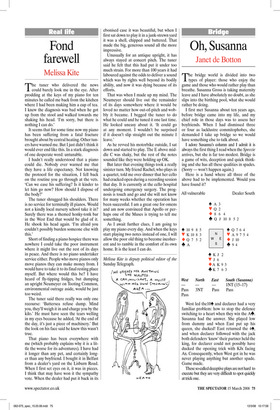Fond farewell
Melissa Kite
The tuner who delivered the news could barely look me in the eye. After prodding at the keys of my piano for ten minutes he called me back from the kitchen where I had been making him a cup of tea.
I knew the diagnosis was bad when he got up from the stool and walked towards me shaking his head. ‘I’m sorry, but there is nothing I can do.’ It seems that for some time now my piano has been suffering from a fatal fracture brought about by central heating. Other tuners have warned me. But I just didn’t think it would ever end like this. In a stark diagnosis of one desperate word: untunable.
I hadn’t really understood that a piano could die. Nobody ever warned me that they have a life expectancy. Not knowing the protocol for the situation, I fell back on the routine you go through at the vets. ‘Can we ease his suffering? Is it kinder to let him go now? How should I dispose of the body?’ The tuner shrugged his shoulders. There is no service for terminally ill pianos. Would not a kindly local nursery school take it in? Surely there was a themed honky-tonk bar in the West End that would be glad of it. He shook his head again. ‘I’m afraid you couldn’t possibly burden someone else with this.’ Short of finding a piano hospice there was nowhere I could take the poor instrument where it might live out the rest of its days in peace. And there is no piano undertaker service either. People who move pianos only move pianos they can make money from. I would have to take it to its final resting place myself. But where would this be? I have heard of fly-tipping fridges, but dumping an upright Neumeyer on Tooting Common, environmental outrage aside, would be just too weird.
The tuner said there really was only one recourse: ‘Battersea refuse dump. Mind you, they’ll weigh it in and charge you by the kilo.’ He must have seen the tears welling in my eyes because he added, ‘At the end of the day, it’s just a piece of machinery.’ But the look on his face said he knew this wasn’t true.
That piano has been everywhere with me (which probably explains why it is a little the worse for its adventures). I have had it longer than any pet, and certainly longer than any boyfriend. I bought it in Belfast from a dealer’s yard on the Lisburn Road. When I first set eyes on it, it was in pieces.
I think that may have won it the sympathy vote. When the dealer had put it back in its ebonised case it was beautiful, but when I first sat down to play it in a junk-strewn yard it was a shell, chipped and battered. That made the big, generous sound all the more impressive.
Unusually for an antique upright, it has always stayed at concert pitch. The tuner said he felt that this had put it under too much strain. For more than 100 years it had laboured against the odds to deliver a sound which was by rights well beyond its bodily ability, and now it was dying because of its efforts.
That was when I made up my mind. The Neumeyer should live out the remainder of its days somewhere where it would be loved no matter how out-of-pitch and wobbly it became. I begged the tuner to do what he could and he tuned it one last time. He looked uneasy about it. ‘It could go at any moment. I wouldn’t be surprised if it doesn’t slip straight out the minute I leave.’ As he revved his motorbike outside, I sat down and started to play. The E above middle C was shaky, but the rest of the notes sounded like they were holding up OK.
But later that evening things took a really sinister turn. My friend Rachel, who plays in a quartet, told me over dinner that her cello had cracked open during a recording session that day. It is currently at the cello hospital undergoing emergency surgery. The prognosis is touch and go and she will not know for many weeks whether the operation has been successful. I am a great one for omens and am now convinced that Apollo or perhaps one of the Muses is trying to tell me something.
As I await further clues, I am going to play my piano every day. And when the keys start playing two notes instead of one, I will allow the poor old thing to become incoherent and to ramble in the comfort of its own home. It is the least I can do.


























































































 Previous page
Previous page